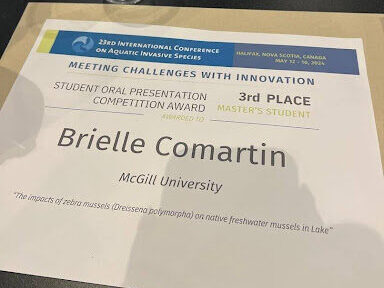By Brielle Comartin, a MSc student at McGill University
I recently had the opportunity to present my Master’s research at the International Conference on Aquatic Invasive Species (ICAIS 2024). Although the conference was not international for me (it took place in Halifax, Nova Scotia), over 300 people attended from all over the globe, including places such as Belgium, Fiji, Northern Ireland, Estonia, Netherlands, Philippines, United States and England. ICAIS was my first conference at this scale, making it a great opportunity and learning experience. Here is my anecdotal list of dos and don’ts when attending an international conference

Before the conference
DO: Participate in pre-conference social events
DON’T: Only socialize with your lab mates during the pre-conference social events
My lab mate and I decided to show up fashionably late to an event organized for students and early career professionals the night before the official conference. However, our tardiness resulted in there being no spots left at the communal table, and we were forced to sit by ourselves. At this point, discussions (and drinks) were flowing between students at the communal table, and we felt too shy to join the group. We missed our opportunity to make connections with people our age from different countries with similar interests. Not to mention, it would have been nice to have some familiar faces in the room during my presentation.
Presenting your research during the conference
DO: Present your research (poster or talk) with confidence
DON’T: Underestimate yourself
In my opinion, the primary reason for attending a conference is to hear about the latest research happening in the field. I highly recommend presenting your research so you can be a central part of that conversation. (Yeah, I know this is something your supervisor probably says too!). But seriously, present something! Whether it’s a poster or a talk, this will open many doors for you, career-wise, in ways you might not expect. I was extremely nervous to give a 15-minute talk, and probably even more nervous about the 5-minute question period that would follow. I also thought everyone could tell how nervous I was when I presented. However, to my surprise, I was awarded 3rd place for the best student talk at the conference closing ceremony and was also approached by many professionals to have further discussions regarding my research. Although giving a presentation is extremely nerve-racking, it can be SO rewarding.


Where to stay during the conference
DO: Stay somewhere that is a walkable distance from the conference venue
DON’T: Stay in the hotel suggested by the conference organizers
Typically, hotels suggested by the conference organizers are very close to the conference center for convenience. However, these hotels cost a fortune per night, which is unrealistic on a student budget where the conference expenses are often being funded by minimal grant money. My lab mate and I opted for an Airbnb that was a 20-minute walk away from the conference center. By doing so, not only were we able to save money, but by the end of the conference we were also extremely familiar with the city of Halifax from taking different routes to the venue every day. Okay, so maybe we had to share a bed in a 100 sq ft space, but that’s all part of the fun, right? Besides, you won’t be spending much time in your room – it’s the perfect opportunity to explore a new city!
Networking during the conference
DO: Introduce yourself to professors, government scientists, etc. on the first day
DON’T: Feel like you are “being a bother” when trying to network
One thing I realized quickly during this conference was that professionals in the field want to be spoken to. One of the main purposes of a conference is to network, and that holds true for those with already established research careers as well. When approaching a professor, a simple introduction of my name, research group and university was enough to get a conversation started. As many of my conversations were not even academically focused, I realized that these professionals are regular people that were once in the same position as me, just looking to have a chat. Having these conversations during the coffee breaks on the first day was extremely beneficial, as I no longer felt like a stranger in a room full of strangers. Plus, I got to hear some great anecdotes from professors and government scientists who worked with my supervisor back in the day (which I can now tease him about)!
Non-conference related activities
DO: If feasible, extend your stay beyond the conference dates to explore the city
DON’T: Hide out in your room after the conference
This was my first time in Nova Scotia, so I took the opportunity to extend my stay by a couple of days to explore Halifax and surrounding areas. Because, why not? If extending your stay is not an option, take advantage of your evenings post-conference. My lab mate and I were able to redeem ourselves from our missed opportunity of socializing with other students when we were strolling by the waterfront and ran into some faces we recognized from the conference. Over a few drinks, we learned about their remote research in Fiji and the Philippines! Later in the week, over lunch with some Belgian students, we learnt about how difficult securing funding is for PhD students in Europe. While out exploring, we were also joined by a student from England who saw a fire hydrant for the first time! Overall, our post-conference social evenings and days exploring the province really allowed our entire conference experience to be a positive one.



About the author:
Brielle Comartin is an MSc student in Biology at McGill University under the supervision of Prof. Tony Ricciardi. She is interested in conservation biology and aquatic ecology, and currently researches the impacts of invasive species on native biodiversity in a freshwater ecosystem.
Twitter: https://x.com/briellecomartin

0 Comments